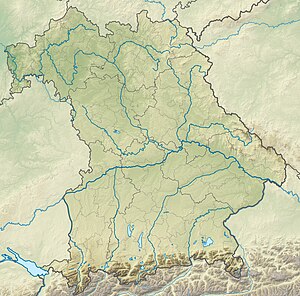Heilsberg castle ruins
| Heilsberg castle ruins | ||
|---|---|---|
| Creation time : | Mid 12th century | |
| Castle type : | Höhenburg, spur location | |
| Conservation status: | Keep and wall parts | |
| Standing position : | Nobles, dukes | |
| Construction: | Cast masonry, granite hump blocks | |
| Place: | Wiesent- Pangerlhof | |
| Geographical location | 49 ° 2 '24.8 " N , 12 ° 23' 6.3" E | |
| Height: | 420 m above sea level NN | |
|
|
||
The Heilsberg castle ruins are the ruins of a hilltop castle at 420 m above sea level. NN about 200 meters southeast of the Pangerlhof district of the Wiesent community in the Upper Palatinate district of Regensburg in Bavaria .
history
The castle was probably built in the middle of the 12th century by the later Truchessen from Heilsberg and Eggmühl . The castle served the colonization development of the forest areas north of the Danube, which belonged to the diocese of Regensburg. A Ulrich Heilsberg appear around 1170 in a traditional note of the monastery Prüfening , at this time, a Wernhardus of Heilsperg occurs. The Heylsperch square was first mentioned in 1213 in a contract between the Regensburg Bishop Konrad IV von Frontenhausen and Duke Ludwig der Kelheimer . Ulrich von Heilsberg's successor was Eckbert, who alternately called himself after Heilsberg or Eggmühl . This was both the Duke's truchess as well as Vogt over various properties of the Regensburg Bishopric . Eckbert's grandchildren, Ulrich and Heinrich, apparently shared the two lords of Heilsberg and Eggmühl and one of them acted as Truchseß von Heilsberg and the other as Truchsess von Eggmühl. Both lines are believed to have died out in the first half of the 14th century.
In 1333 Konrad von Nothaft bought the castle as a fief of the Regensburg bishopric . The focus of the rule shifted increasingly to Wiesent , so that Heilsberg became dispensable as a noble residence. It should be noted that Heilsberg was an undisputed fief of the Regensburg bishops until the middle of the 15th century, when the Wittelsbachers seized both possessions. In 1505 the area was added to the newly founded Duchy of Pfalz-Neuburg .
Until the property came into contact with Wiesent in the 16th century, the castle changed hands frequently. For a while it was owned by the Kolb family from Regensburg. In the 1580s it belonged to Hieronymus Kolb von Wiesent und Heilsberg, son of the late Hans Heupolt Kolb, who inherited the property from his uncle. In 1593, 1595 and 1596 he was the keeper of Velburg . Among others, the dukes Duke Ludwig the Bearded of Ingolstadt , Duke Albrecht and Duke Ludwig von Landshut are mentioned. In the 16th century, despite several renovations , the castle was abandoned and left to decay. In 1644 the abbot Stephan von Frauenzell von Heilsberg reported as "an ancient, collapsed castle built from ashlar pieces" and only "Rudera" (= rubble) of the castle chapel of St. Egidius can be seen.
Heilsberg is still called today as part of the Wiesent community.
The name is also mentioned as a former monastery in the Wiesent community.
description
The castle complex had a distinctive wall-ditch system with a circular wall and a deep neck ditch in the northwest as well as a square keep on a floor area of 7.5 by 7.5 meters made of cast masonry , clad with 2.5 meter thick granite hump blocks .
Remains of the keep, the enclosing walls and parts of the curtain wall are still preserved from the former castle complex. Remnants of the wall of a building in the south-east suggest a gate. Since 2005, work to preserve the ruins has been carried out by the Association for the Preservation of Burgruine Heilsberg e. V. instead. The Burgplatz is a ground monument .
poem
Poem by the local poet Josef Feller from Wörth
"Heilsberg"
- In the Pangerlschloss down there near Wörth
- Has it been right (haunted) of times
- I've often heard it goar
- As a Bua from old people
- Z'Frauazell were allowed in the inn
- Got a Pangerlbauer troffa
- Dees is a high eighty scho
- But no gloffa comes with the beer
- I ask: cousin, don't you know?
- In the old castle down there
- Or san de Gschpenster all together
- mitananda scho 'disappeared?
- As the old 'toothlucked Mo' says
- And spread the feet right
- A Neamad believes more about it
- What's the point of no wheat?
literature
- Andreas Boos : Castles in the south of the Upper Palatinate - the early and high medieval fortifications of the Regensburg area . Universitätsverlag Regensburg, Regensburg 1998, ISBN 3-930480-03-4 , pp. 143-148.
- Ursula Pfistermeister : Castles of the Upper Palatinate . Friedrich Pustet Verlag, Regensburg 1974, ISBN 3-7917-0394-3 , p. 87.
- To Heilsberg Castle → Harald Stark : The Notthracht family - looking for traces in Egerland, Bavaria and Swabia , Weißenstadt 2006, ISBN 3-926621-46-X
- Wolfgang Lutz: Heilsberg Castle . Methods and measures to preserve the ruin. In: Regensburger Land . tape 1 , 2008, ISBN 978-3-9812370-0-9 , pp. 87-108 ( digitized [PDF]).
Web links
- Heilsberg castle ruins at burgseite.de
- Heilsberg , family Notthracht
- Heilsberg castle ruins at wiesent.de
Individual evidence
- ^ Elisabeth Gäde: Conrad Teufel von Pirkensee (1527-1582). In the service of princely lords across Europe. Die Oberpfalz , 104th year, 2016, pp. 92–93.



